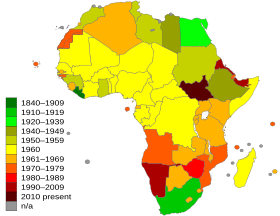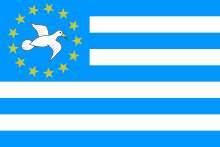Postcolonial Africa
The last African countries to gain formal independence were Guinea-Bissau (1974), Mozambique (1975) and Angola (1975) from Portugal; Djibouti from France in 1977; Zimbabwe from the United Kingdom in 1980; and Namibia from South Africa in 1990.
[3] In 1934, the "Neo Destour" (New Constitution) party was founded by Habib Bourguiba pushing for independence in Tunisia.
[7] Following World War II, nationalist movements arose across West Africa, most notably in Ghana under Kwame Nkrumah.
Since independence, many West African nations have been plagued by corruption and instability, with notable civil wars in Nigeria, Sierra Leone, Liberia, and Ivory Coast, and a succession of military coups in Ghana and Burkina Faso.
Many states have failed to develop their economies despite enviable natural resources, and political instability is often accompanied by undemocratic government.
Due to its isolated position from the coasts, this area has received minimal attention from historians pertaining to Africa.
Due to its territory, among the main trope s regarding Central Africa is traversing its lands and the nature of its tropicals.
[11] Since 1982, one of the main protracted issues within central Africa has been the ongoing secession movement of the secessionist entity of Ambazonia.
The impasse between Cameroon and Ambazonia gained steam in 1992 when Fon Gorji-Dinka filed an international lawsuit against Cameroon claiming that Ambazonian territories are held illegally by the latter and describing Cameroonian claims on Ambazonian territories as illegal.
Fifteen years later, this stalemate would escalate when Abmazonia formally declared itself as the Federal Republic of Ambazonia.





